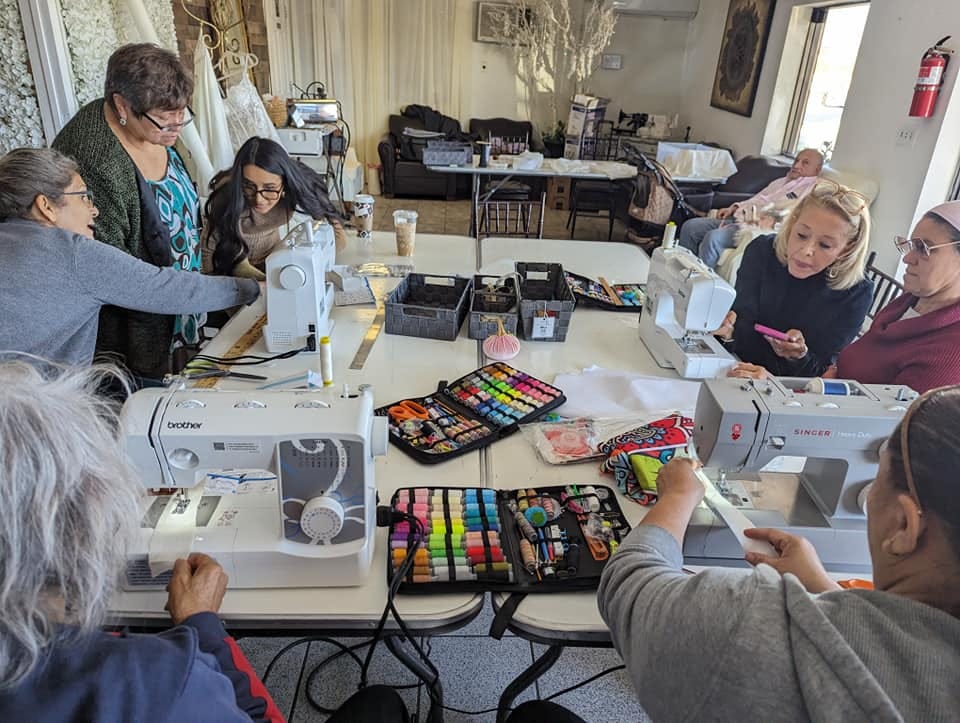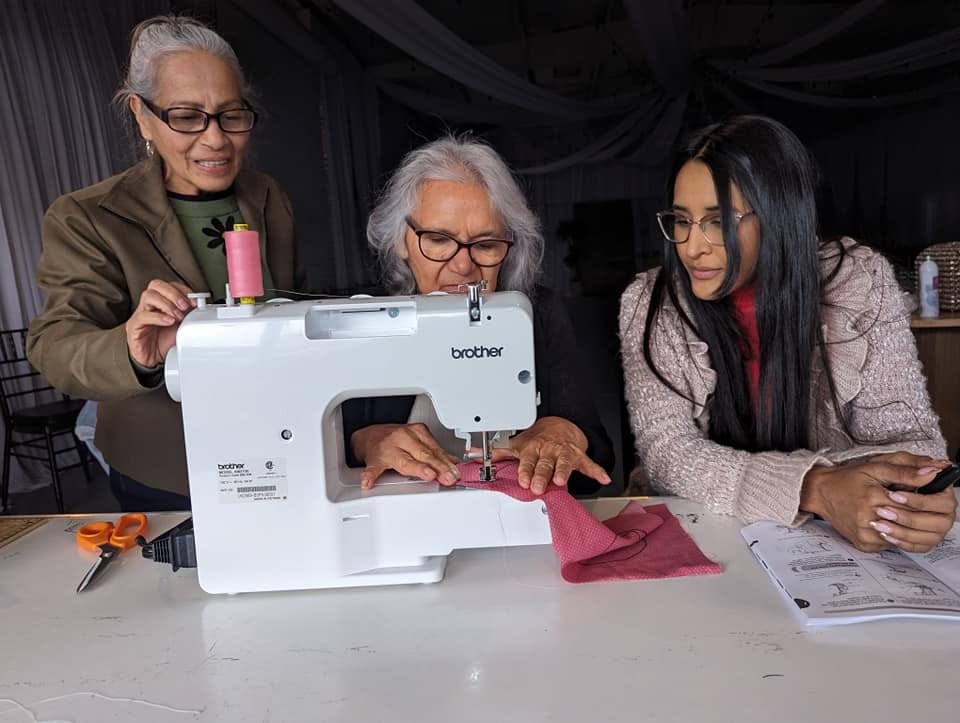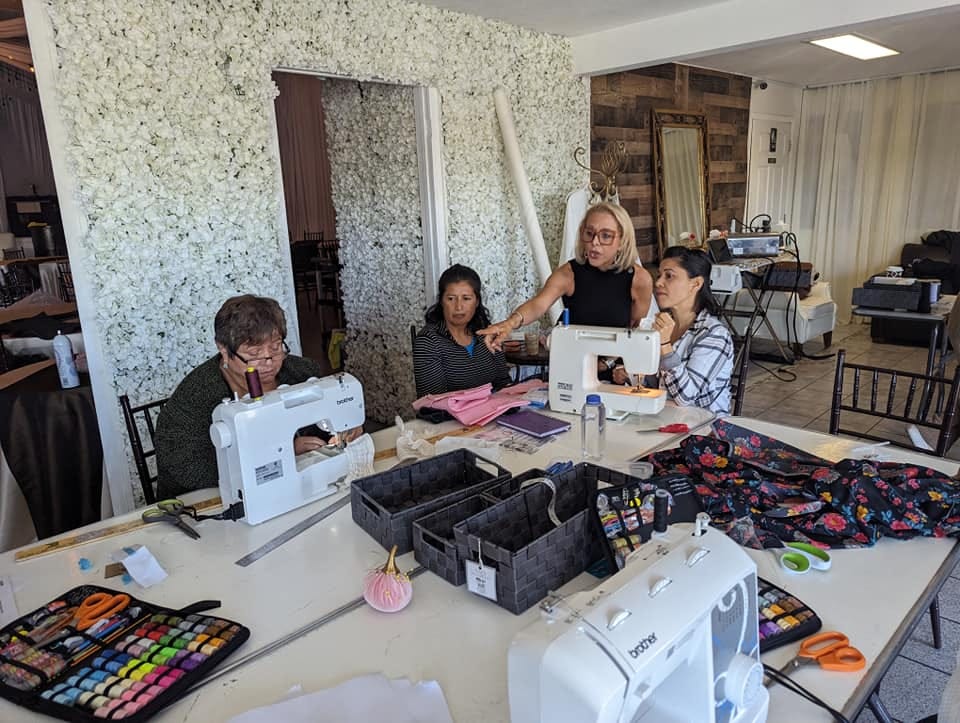The Daily Agenda: Sewing (full) circle
A longtime Tucson seamstress is passing along her craft, thanks to a city grant ... She's hoping to recreate a community-based model ... Marana prison set to close.
Joyce Feickert fell in love with sewing when she was 4 years old.
She would watch her mother work for hours and when Feickert showed interest in learning to sew herself, her mother embraced her curiosity and began to teach her the craft.
Feickert moved to Tucson from South Dakota when she was 21 with little more than her sewing machine, and although she didn’t know a single person, she soon found a community.
In the decades since, she has made more than a career out of sewing, helping countless customers look their best for special occasions, building connections and mentoring other sewers along the way.
With her latest endeavor, Feickert’s journey has come full circle, as she’s now teaching the trade to women on Tucson’s south side and helping them to create financial opportunity.
“My vision is that you take the people and you give them back that neighborhood seamstress who alters the karate kids’ outfits, that alters the prom and quinceañera girls in their neighborhoods,” she said.
Feickert said it’s something she’s wanted to do forever as a way to give back to the community that embraced her all those years ago and also to honor her mother. Thanks to a City of Tucson American Rescue Plan Act Community Partner Grant, she can finally make it happen.

When Feickert was caught sneaking into the sewing room the first time, she expected her mother to be angry. But her reaction was quite the opposite.
“She took me to a drawer of fabrics and told me I could use any of the fabric as long as I finished what I started,” she said. “I literally went into her sewing room at four and started pedaling on her machine. I said, ‘I’m going to be with you my whole life.’”
Feickert learned how to make her own patterns out of newspaper, using kitchen knives and department store catalogs instead of pins to line up the fabric on the kitchen table of her family’s farmhouse.
When she moved to Tucson years later, she started sewing out of her midtown apartment, posting flyers in her neighborhood advertising alteration services.
“I had all these people from all the apartments around coming to my apartment. I would do everything for the neighborhood,” she said. “They protected me, my customers. Tucson is phenomenal like that. And a lot of these customers became my friends.”
Eventually, she moved into a storefront, a tiny space next to a barber shop that cost $250 a month including electricity.
In 1983, she opened Hem and Her Bridal with her husband, Marvin Kirchler, and the pair watched the business grow over the years.
Their family grew along the way, too.
Five years ago, Tucsonan Yissel Mankel was trying to learn how to sew and was interested in taking classes, but the basic lesson to learn how to make a pillowcase cost $50.
“Every time that you would try to learn something different about the machine, it was another price,” said Mankel, who now works as a designer at Hem and Her. “You can’t learn the machine by just that. You need the actual teacher to teach you.”
Mankel found Feickert, who took her under her wing, teaching her how to sew and eventually design her own costumes and formal wear. Feickert calls Mankel the daughter she never had. They finish one another’s sentences.

But Feickert never waned in her desire to bring sewing to the masses, and last fall, she finally had an opportunity, when Kirchler saw an announcement about the second round of City of Tucson ARPA funding. He encouraged Feickert and Mankel to apply for a grant to teach community members how to sew.
“We have such a unique niche,” Kirchler said. “One of the ladies on the interview committee, we touched a nerve I think because her mother or grandmother was a sewer.”
A few months ago, they received a letter saying their grant had been approved.
They knew they wanted to work with people who had already expressed an interest in learning to sew and were encouraged to check out Sicomoro Community Services, a nonprofit supported by Marymar Events, which had a sewing program in need of help.
Feickert and Mankel visited the center and realized right away that they could make a big impact.
“They were using machines where they didn’t know the first thing about how to thread,” Kirchler said. “Even the fabric that they were using, the wrong needles. All the basic stuff.”

The Monday before Thanksgiving, Feickert and Mankel taught their first class at Marymar to a group of 15 women of various ages. During that first class, the women learned how to use the new sewing machines, which were purchased with grant funds.
A week later, during their second class, they made pajama pants. Feickert said they were ecstatic to bring home something they’d made on their own from start to finish.
“They’re like magnets the way they absorb what Yissel and Joyce are saying,” Kirchler said. “This model that she talked about sewing out of her house is exactly what we want to create with the ladies, where there can be that neighborhood sewer”
Several of the students in the class are single parents and learning to sew allows them to build businesses out of their own homes. Mankel, who grew up in the area, said that the women are excited to learn a trade that will allow them to work from home.
“Talking to the ladies that we’re teaching, a lot of them want to create jobs for themselves,” she said. “They have kids that are in school and when they’re out of school, they don’t have affordable daycare.”
The plan is to keep the classes going as long as they can afford to. The trio is already thinking about the third round of city ARPA grants set to open in the spring.
And while Feickert is proud to teach women a skill that can help them earn a living while also connecting with their communities, she said that sewing is so much more valuable than just a source of income.
“It’s not only the money, it’s the mindset. The process of sewing does not let you get ahead of yourself. You have got to keep in that moment, and that give you such control and power, being in the moment with your work,” Feickert said. “You can’t get ahead of yourself. Just like life, you really can’t skip a step.”
Street racing solutions: Tucson police are seeking nearly $1 million in technology to help fight illegal street racing, the Arizona Daily Star’s Charles Borla writes. The city council asked City Manager Mike Ortega to work on finding ways to fund the equipment, which includes a speed enforcement van, pan-tilt-zoom cameras, automated license plate readers, gunshot detection systems and encrypted police radio systems. Ortega said an updated plan could be presented to the council by March.
Freedom of the press?: Pima County Sheriff’s deputies arrested KJZZ reporter Alisa Reznick and 25 others yesterday while she was covering a pro-Palestinian protest at the UA Tech Park off Rita Road, KJZZ’s Ben Giles reports. Reznick was wearing a press pass and identified herself as a reporter. Pima County Sheriff Chris Nanos defended the deputies involved, saying after protesters had blockaded the road, Reznick and the protesters were warned to leave.
The weakest link: University of Arizona researchers are studying the behavior of British game show contestants to gauge people’s reactions to stress and adversity, Arizona Public Media’s Tony Perkins reports. UA Psychology Professor Robert Wilson and his team looked at how often contestants blinked to find clues about real-world decision-making.
“What we are trying to do with this project is to understand behavior but also neural or psychological correlates of behavior in the real world, so game shows are one way to do that,” Wilson said.
Closing its doors: The state is ending its contract with the minimum security private prison in Marana, KVOA’s Sarika Sood reports. The contract expires at the end of the year, with all inmates to be moved to other locations. The move is expected to save the state $15 million over the next few years. The prison has averaged 225 inmates over the last several years and its more than 50 employees will receive help finding jobs at other state facilities.
Changing the rules: The City of Tucson has approved new rules for food truck courts, including limited operating hours, no outdoor indoor combustion generators and more, KGUN’s Andrew Christiansen reports. Food truck courts can only be open from 7 a.m. to 10 p.m., with on-site management present during all hours of operation. They also can’t have loudspeakers or live music within 600 feet of homes.
Investment opportunity: Tucson Unified School District is considering selling its longtime administration building for a little more than $18 million, the Star’s Jessica Votipka writes. Chicago-based developer Campus Properties LLC, which owns Hub high-rise apartment complexes in Tucson and other cities, would redevelop the site for housing, which is possible through zoning options in the city’s Sunshine Mile Overlay District.
We’re raising funds to grow our digital team. You can make a tax-deductible donation through the end of the year by clicking the button below.
$136.2 million: The amount of American Rescue Plan Act funding the City of Tucson will invest through December 2024 in community partners and city-managed projects.









Great story about Joyce Feickert, building community, supporting home-based businesses, and meeting a real need. While there are some alterations shops in town, the opportunity for new sewing businesses is apparent by the current shops’ overload. Joyce and Yissel bring the knowledge and experience to help their students learn the business skills necessary to succeed.
Love the story about Joyce Feickert! Great to see the positive impact of government dollars on our community.